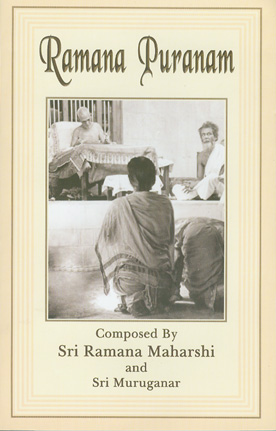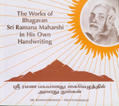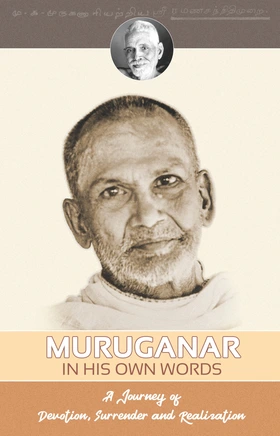| Ancient Texts | Biographies | Commentaries | Compilations | Records | Reminiscences |
| Translations | Arunachala elibrary |
Miscellaneous | |||
Translations From the Writings
of Sri Ramana Maharshi
view these items in our
on-line bookstore

Collected Works of Ramana Maharshi - Sri Ramanasramam
Edited by
Arthur Osborne. A collection of English translations of all Sri Ramana Maharshi's Tamiḷ works, including both his original compositions and others which he translated from different languages. The editor adds a short note before each entry explaining its genesis. In this new 1996 edition certain texts translated by Arthur Osborne have been replaced by those of
Prof.K.Swaminathan, T.K.Jayaraman and Michael James. (New Indian Edition)
pp.319
Table of Contents

Five Hymns to Arunachala, and Other Poems
This is an English translation of the earliest of the Maharshi's poems. These poems, all written around 1914, were later collected and titled
Sri Arunachala Stuti Panchakam. They consist of devotional hymns sung in praise of Arunachala, with directions for attaining the Supreme State.
pp.180
Excerpt
![]()
Muruganar In His Own Words
Sri Mugavai Kanna Muruganar expressed his devotion by composing 30,000 exquisite Tamiḷ poems over a span of 50 years in praise of his Satguru, Bhagavan Sri Ramana Maharshi. These poems have been published under various titles including Sri Ramana Sannidhi Murai, Sri Ramana Jnana Bodham, Guru Vachaka Kovai etc., while some have been lost forever. Sri Muruganar took great care not to reveal many details about his own spiritual journey. However, he has left subtle clues buried in the depths of his brilliant poetry.
This book is a celebration of this beloved poet’s spiritual journey — his inspiration, his struggles, his singular love, his complete surrender, his meticulous documentation of his Guru’s teachings, and his supreme realization — all revealed through his own words from the epic collection of his verses. Though these verses were written in classical Tamiḷ, this book seeks to make them accessible to everyone including non-Tamiḷ readers. It also delves into Muruganar’s influences from ancient saint-poets, the socio-cultural context during his youth, and his friendships with literary figures and devotees. Most importantly, this work highlights Sri Muruganar’s unwavering single-pointed devotion and reverence for Bhagavan Sri Ramana Maharshi. We pray to Sri Bhagavan that devotees will benefit from reading this book and also understand the value of devotion and surrender.pp.550 see srmh.org, gururamana.org, ToC, excerpts,

Poems of Sri Ramana Maharshi
A versified English translation by Sadhu Arunachalai (Major A.W.Chadwick) of Sri Ramana Maharshi's philosophical poems and stray verses. These English translations were gone over word-by-word by the Maharshi and the translator writes, "He was very particular and not at all sympathetic to poetic license. The genesis of each poem is also given.
pp.48

Parayana, The Poetic Works of Bhagavan Sri Ramana Maharshi
The text of this volume contains the full repertoire of the
daily recitation at
Sri Ramanasramam. While it includes devotional hymns written by devotees about Sri Bhagavan, it principally consists of the original Tamiḷ poetry of the Master himself. Presented in legible Roman script with adjoining English translations, this compendium is sure to prove invaluable not only for non-Tamiḷs who want to chant Sri Ramana's verses but also for those who long to imbibe ever more deeply in the boundless wisdom they contain.
ISBN:81-8288-061-0
pp.301

Ramana Purāṇam
In the 1920s and 30s Muruganar wrote Sri Ramana Sannidhi Murai, an anthology of devotional poems in praise of Sri Bhagavan that was modeled on the Tiruvācakam of Manikkavacakar
While he was composing in Sri Bhagavan's presence, he took a break to go out and think about the title. When he returned to the hall, he was astonished to discover that Bhagavan had not only named the poem Ramana Purāṇam by writing this title on every page of the manuscript, he had also completed it by composing and adding about 300 additional lines.
Mr.Robert Butler, Dr.T.V.Venkatasubramanian and Mr.David Godman deserve the grateful thanks of all fellow devotees for translating and annotating this important text. It is now available to devotees who know English.
pp.98
more

Revelation (Sri Ramana Hridayam)
A Sanskrit verse-rendering of Sri Ramana Maharshi's
Ulladu Narpadu (Forty Verses on Reality) and Anu-bandham (Supplement to the Forty Verses), with an English translation, authored by `Who' (K.Lakshmana Sarma), writer of Maha Yoga.
pp.101

Sri Arunachala Stuti Pancakam, Five Hymns in Praise of Sri Arunachala
This book, with commentary by Sadhu Natanananda, is the blessed outpouring from the sacred lips of Sri Ramana Maharshi with Sri Arunachala as the hero of the psalms.
see also
Tamiḷ Hymns CD,
Five Hymns,
Collected Works, ToC &
downloads
pp.112

Sri Ramana Gita
By
B.V.Narasimha Swami, the author of
Self-Realization. About the year 1930 while residing with the Master, the author, undertook a literary work - a recreation of
Kavyakantha Ganapati Muni's
Sri Ramana Gita in its original conversational, question-and-answer form. This enterprise was undertaken more than a dozen years after the conversations that comprise Sri Ramana Gita actually took place. With the help of the Maharshi and other devotees and with recourse to his own erudition,
B.V.N. was able to recreate thirteen of the eighteen chapters. These are presented in this book. They use simple language and are easy to understand.
pp.50
text

Truth Revealed (Sad-Vidya)
An English translation of Sri Ramana Maharshi's
Ulladu Narpadu and Anubandham, each consisting of forty verses. In these verses, composed, selected and arranged by the Maharshi, the Ultimate Truth and the path leading to It is revealed. The introduction is by
Grant Duff.
pp.33

Who Am I?
About 1902
Sivaprakasam Pillai put several questions to the Maharshi and, since the Sage was not then speaking, they were answered in writing. These answers constitute the first set of instructions written by the Maharshi and remain the quintessence of all the teachings he gave thereafter.
pp.15
![]()
![]() Table of Contents
Table of Contents

Words of Grace
Nan Yar? (Who am I?) and
Vichara Sangraham[1]
(Self-Enquiry) constitute the first set of instructions in the Maharshi's own words, written by him between 1900 and 1902. These two are the only prose compositions among Bhagavan's works. They clearly set forth the central teaching of
Self-Enquiry as the direct path to liberation.
Upadesa Manjari
(Spiritual Instruction)
is the reply to seventy questions put to the Maharshi by
Natananandar. Words of Grace is a valuable English translation of these three works.
pp.68
![]()

Works of Bhagavan Sri Ramana Maharshi in His own Handwriting
Published by Sri Ramana Kshetra. Contains reproductions of all of the Maharshi's compositions written in his own handwriting. The last fifty-nine pages provides us with accurate translations of these works.
pp.165
Appalam Song
[1]
Vichara Sangraham is Ch.26 of
Kunju Swami's
Reminiscences
It is the Q&A version of
Self-Enquiry

